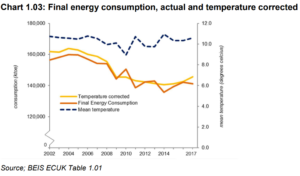
This weekend The Sun released an article claiming that British families’ energy bills have rocketed by a fifth, paying £4.6bn extra, even as use is down by a fifth. They blame this on the actions of “greedy energy firms” over the past decade. We thought this was a pretty interesting take on the state of the UK energy market, so we wanted to do a bit of digging; are we really being overcharged for our energy bills?
Energy Use Has Fallen Significantly…
Since 2002 domestic energy consumption has fallen by 17% – hooray! Consumption per household between 2016 and 2017 fell by just under 5%. Not bad going. This has come down to a wide number of factors.
First of all, we’ve been building more houses. Although we hear a lot about the UK housing crisis, the number of households in the UK since 1970 has risen by nearly 50%. The population has grown too, but not as fast, with only 19% growth since 1970. This means fewer people per household, and as your mum was probably delighted to remind you after you moved out for uni, less people in the house means much less energy used by the household. Although more houses does mean more overall energy consumption as a country, on an individual household basis it helps explain lower usage.
Retrofitted energy efficiency measures have also had a huge effect, which we’re obviously absolutely delighted about. Let’s take water as an example; in 1976, 87% of households had a hot water tank, of which only around three quarters were insulated in any way. With the increased use of combi and condenser boilers, neither of which requires a hot water tank, the number of tanks in UK households has fallen to around half, with 99% of them being insulated. (If you’re still on a hot water tank system and you suspect that it’s not required, remember that installing a condensing boiler can reduce consumption by 7.5%.) Double glazing is another measure that has been widely implemented, rising from just 9.5% of households in 1983 to 71% in 2008. More recently solid wall insulation, which can reduce energy consumption by a whopping 12%, has become more widespread, though we hope the coming years will see it pick up even more.
Electrical appliances have also been upping their energy efficiency game. In what I’m going to call a ‘light bulb moment’ for the UK, we all started switching to LED instead of the expensive, inefficient old style. Other things you might not know is how much more efficient our large appliances, such as fridges and washing machines have become over the last 20 years.
The other reason for the drop is, of course, the rising price of energy.
… But Energy Bills Have Risen
There’s no easy way to say it- since 2005, gas and electricity prices have more than doubled. We’ve reached a point where more than 1 in 10 of every British household is in fuel poverty (defined as those with above average energy costs where their income would fall below the official poverty line after paying to heat and light their home.) These nationwide price increases have left many people wondering if they are being overcharged and paying too much for their energy bills.
Energy companies like EDF, Scottish Gas and British Gas have announced not one but two price hikes on their standard tariff rates this year. They’re blaming rising wholesale energy prices, which were highlighted in fairly abrupt fashion by the Beast from the East in 2018, as well as government policy. According to Mark Hodges, the head chief executive of Centrica (British Gas’ holding company), the fault is to be found with government policies aimed at transforming the energy industry towards renewables. Mr Hodges believes these costs would be better integrated into general taxation to avoid putting pressure on suppliers and consumer energy bills.
What’s The Solution If I Think I’m Being Overcharged?
Vince Cable, leader of the Lib Dems, said recently “These figures are completely baffling. Despite people reducing their energy usage significantly, they have been left out of pocket by £4.6billion. People shouldn’t be punished for using less, but instead due to the monopoly power of the Big Six they have been exploited with price rises.”
If Cable is right and the monopoly of the Big Six energy companies (British Gas, EDF, E.ON Scottish Power, SSE and npower) is the problem, is the solution to switch to a smaller company? Despite a concerted effort by the government to open up the energy market, currently around 82% of the UK is still supplied by one of the six big hitters. The remaining 18% gets its energy from 63 smaller companies, the vast majority of which have come in to existence in the past 15 years. Several local councils have also set up non-profit energy schemes to alleviate fuel poverty and focus more on renewables in their areas, most notably Nottingham’s Robin Hood Energy and Leeds’ White Rose Energy.
These smaller suppliers are not tied down to all the same government policies as the bigger companies, such as ECO (Energy Company Obligation) funding programmes. This allows them enough savings that they are often able to provide cheaper energy than their heavyweight counterparts. It doesn’t affect your ECO eligibility in most cases either, as companies are able to offer ECO solutions to those outside of their customer base. The criteria varies between companies:
- E.on – available to all. Apply via E.on’s site – you have to apply for cavity wall insulation first and request loft insulation on top during your free home survey. If you’re on benefits, you can also apply for loft insulation on its own through this E.on link instead.
- Npower – available to all. Check this on Npower’s site. If not on benefits, you can get cavity wall insulation, or both cavity wall and loft insulation if installed at the same time. Those on benefits can apply for loft insulation on its own.
- EDF – only available to EDF customers. Check EDF’s site. You can apply for either loft insulation whether you’re on benefits or not.
- SSE – only available to those on certain benefits. See its full eligibility criteria or fill out an online enquiry form.
If you’re interested in finding out whether you can be getting a better deal on your energy costs, we suggest running a price comparison to see what’s available in your area.
Think we missed something? Do you have a different opinion?
Comment below to get your voice heard…













Yes this is very true! me and my family are thinking of buying solar panels soon because of huge bills!
Just got a £400 electricty bill for 2 months. Sounds very high but not sure how to check it is correct? Any quick ways to tell
Hi Sandy,
I suggest that you take at look at this article and this one here, they may be able to help explain what’s going on!
We got moved from Economy Energy when they shut down and since then my bills have rocketed, even though they told us we would stay on the same tariff as we had with our old company. It’s really not on.